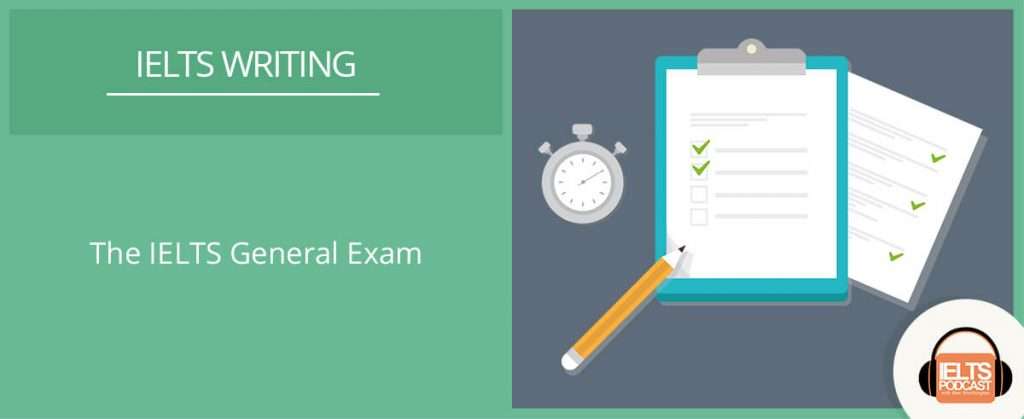The IELTS General Exam
Home »
IELTS Exam »
IELTS General Exam
What is the IELTS General Training test?
IELTS stands for the International English Language Testing System. It is an exam that tests your English language proficiency. It consists of a
Notice that there is no grammar or vocabulary section. That is because these are tested implicitly throughout the test.
Why take the General Training version of the IELTS exam?
There are a number of reasons why someone might need to take the IELTS General Training test. The most common reason is that you want to immigrate to an English speaking country like Australia, New Zealand, Canada or the UK and need to show proof of your English language ability. Often, potential employers will want to know your level in English and will ask for official certification of your language level. Some training programs that do not lead to a degree might also ask for the IELTS General Training test.
However, if you are looking to enter an educational or training context, for example, you want to enter an English speaking university, you will have to take the IELTS academic test. Also, if you are seeking professional registration, such as applying for a doctor's or nurses license, you will have to take the academic IELTS test.
Similarities between IELTS Academic and General Training
- Both versions are conducted on the same day at the same test centres.
- Both Academic and IELTS General test takers take the same listening test.
- The speaking tests for both versions of the exam are also the same.
Differences between IELTS General Training and IELTS Academic
The IELTS Academic and IELTS General Training tests differ in two areas: Reading and Writing. In the Reading test, the Academic version may feature texts that are an academic subject e.g botany, history, anthropology, or that might be found in a professional environment in an English speaking country. In contrast, the texts in the General test are of broader, more general interest. The IELTS General Training Reading Test topics may be anything that a non-specialist audience would be able to discuss.
The reading test has three different texts that increase in difficulty and length. Question types vary and include multiple-choice, matching sentence endings, sentence completion, diagram label completion and true, false, not given. You may also see some short answer questions.
The IELTS Writing Tests
Task One
IELTS test-takers will have to do two writing tasks in one hour. The first is a letter of approximately 150 words. The
task 1 letter may be formal, semi-formal or informal. For example, you may be asked to write an
informal letter inviting a friend to visit or perhaps a
formal letter requesting information or explaining something. Test takers are recommended to spend no more than 20 minutes on the letter.
Task Two
For
Task two in IELTS General Training, test takers must write an essay that is semi-academic in style. The essay should be at least 250 words in length. IELTS test takers are given a prompt upon which they must develop a detailed logical argument. You may be asked your opinion on an issue, to discuss advantages and disadvantages of a topic or the problems and solutions around a particular situation. No more than 40 minutes should be spent on the essay.
IELTS Speaking Test
The
IELTS Speaking exam is the only section of the
IELTS test that may be conducted on a separate day from the other parts. The exam is one-on-one, with one examiner in the room with the candidate. The speaking portion is tape-recorded from the moment the IELTS test taker enters the room.
Speaking Part 1 lasts approximately 5 minutes, with the examiner asking brief questions about everyday topics (weather, food, weekends, holidays, clothing, etc).
Part two lasts 4 minutes. Test takers are expected to speak at length on a topic for 2 minutes. You are also given one minute to plan your response.
Speaking Part three lasts approximately 5 minutes. Here, the examiner will ask more open-ended questions related to some aspect of the topic covered in part two. In theory, it is supposed to feel like a natural conversation between two people but in reality, the examiner has a list of questions he or she must ask. At the end of the test, the examiner records, " that is the end of the speaking test," and the candidate may leave the room.
Is IELTS General Training easy?
It is widely believed that
IELTS General Training is easier than Academic primarily because the subject matter of the writing and reading portions is less complex. However, if one needs a very high score on the IELTS test, then this will be a challenge, regardless of the test format.
Results are given 13 days following the test date.
Band scores are given in whole or half numbers. the overall band score is rounded up to the nearest.5 but within each test section, scores are rounded down to the nearest .5. If test takers are unhappy with their scores, they may request a re-mark known as an Enquiry on Results. There is a fee involved but in some cases, students have received higher scores after requesting a remark. Contact the team at IELTSpodcast.com for further information about anything IELTS. Or, request an
essay correction and get feedback from our IELTS experts.

